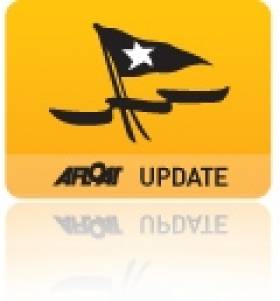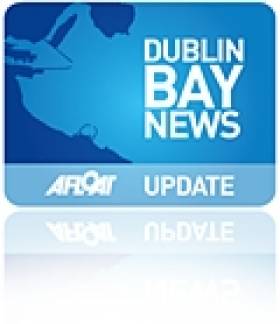Displaying items by tag: bannon
Local Trio Lead 80th Anniversary Mermaid Nationals off Skerries
#mermaid – One of the biggest Irish one design dinghy fleets of the 2012 season has gathered in North Dublin this week to celebrate an important birthday both for the class and Irish sailing. The 80th Anniversary Mermaid Championships in Skerries has attracted 41 entries who have enjoyed very close racing in light winds, strong tides and coped with yesterday's poor visibility with dense fog rolling in from the Irish Sea. Full results to date are available for download below.
Most of the usual names are to be seen at the top of the leader board but a number of new young helms are making their impression, not the least being the consistent performance from 20 year old Mark Boylan and his young crew from Skerries sailing a boat built by his grandfather no177 "This Is It"
After 4 races Mark Boylan leads from a group of former winners including Paddy Dillon in Wild Wind no131 and Roger Bannon in Endeavour no102.
Jonathan O Rourke in Tiller Girl no 77 has recorded 2 back to back emphatic wins but a slow start in earlier races currently holds him in 5th place just behind another multiple championship winner Jim Carthy from Rush in the famous Vee no 123.
The top 3 boats are within 3 points of each other and the race on Thursday when the discard clicks in will undoubtedly have a dramatic impact on the outcome with Tiller Girl hoping to claw back ground lost earlier in the week and go into Friday with a real prospect of success in conditions she normally dominates.
Ex Sailing Chief Lashes 'Grandiose' Dun Laoghaire Harbour Plan
A former Irish Sailing Chief has added his voice to the growing concerns of sailors in Dun Laoghaire to a recently published Harbour Masterplan that Waterfront Yacht Clubs say threatens sailing in the port, Ireland's biggest sailing centre.
The plans, along with the loss of the winter ferry service from the port were featured on RTE News this week.
The Harbour company, who published the designs last month, say the masterplan can create 'a thousand jobs' but a former Irish Sailing Association (ISA) President, Roger Bannon has blasted both the plan and a supporting promotional video (below) as 'grandiose nonsense'.
"The Masterplan will position Dun Laoghaire Harbour as a marine, leisure and tourism destination of international calibre", says Gerry Dunne, Chief Executive Officer, Dun Laoghaire Harbour Company.
"We need to spend an average of €5m a year on maintaining and developing the Harbour infrastructure. The Masterplan will involve investment of more than €230m, over the next 10-15 years and will result in 1000 sustainable jobs in areas such as tourism, marine service companies, select retail, and food and beverage." says the CEO.
But Bannon, a Dun Laoghaire sailing champion, says a plan is needed but the focus instead should be on something a lot more realistic.
"Sure we want a development plan for Dun laoghaire and its Harbour but let's look at something realistic and practical over a 10 year period which we know will work and stay away from this impossible grandiose nonsense.
Mr Leo Varadkar, T.D., Minister for Transport, Tourism and Sport visited the Harbour Board in June to view the Masterplan model and the plans.
During the visit the Minister said he was aware of the very keen local interest in the future development of the harbour. The yacht clubs, who occupy 50% of the harbour waterfront, say the future of the harbour is in marine lesiure.
Bannon's full comments are below:
"What a load of aspirational twaddle. High on sweeping statements and low on specifics. Sounds more like a plan to occupy people in highly paid jobs while nothing will ever happen.
Sure we want a development plan for Dun laoghaire and its Harbour but let's look at something realistic and practical over a 10 year period which we know will work and stay away from this impossible grandiose nonsense.
There are plenty of examples of cost effective developments in many cities around the world, such as Vancouver and Boston, where marine facilities and other resources similar to Dun laogahire have been brilliantly exploited for the general benefit of everyone.
Heaven forbid that our public servants might learn something from others facing the same dilemma elsewhere in the world. Should someone tell the Harbour Board that counting on residential development to generate funding may not work?
Finally, I do not understand how the Harbour Board can take it upon itself to come up with such a plan without integration with local planning for the whole of Dun Laoghaire. Was the video made by DreamWorks?"
Bannon Takes Record Sixth Mermaid Title
After four different race winners (5 including the void race which was resailed) there with three potential overall winners going into the last race. The championship had its usual controversies with one race being deemed void after a rule 66 rehearing of a protest for redress. There were 33 entries from the usual Mermaid strongholds.
The top 3 were:
1st Endeavour 102 Roger Bannon National Yacht Club
2nd Tiller Girl 77 Jonathan O Rourke National Yacht Club
3rd Innocence 188 Anthony Carty Rush Sailing Club
The 80 year old class is not steering shy of new technology. Class techie Peter Scallan organised multiple live blogs on a special web site which provided live updates and photos during every race. http://www.dublinbaymermaid.org and http://www.dublinbaymermaid.org/fenit2011
































































